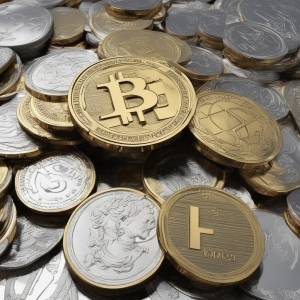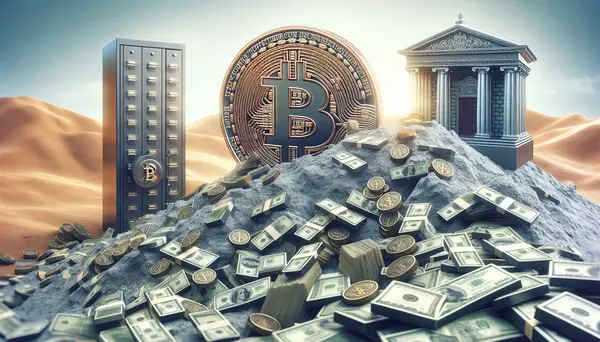Table of Contents:
Introduction to DeFi and Cryptocurrency Investment
Riding the wave of technological evolution, the world of finance and investment is moulding its shape with the inception of cryptocurrencies. In the face of traditional investment methods, these digital assets offer a refreshing and dynamic platform for investors. But the buzzword in the cryptocurrency market right now is DeFi- Decentralized Finance- and the rise of DeFi tokens. Let's delve into the prolific domain of DeFi and how it makes for a compelling aspect of cryptocurrency investment strategies.
DeFi refers to financial services that are decentralized, meaning they are not managed by one entity, like a bank or government, but are rather supported by multiple participants in a blockchain network. DeFi tokens are blockchain-based assets associated with these services. As they come to form a significant segment of the crypto arena, understanding their role and potential is crucial. Young, dynamic, and innovative, they are changing the way we look at investments and financial freedom.
The Best Mining Providers at a Glance
» Infinity HashFrom our perspective, currently the best mining provider on the market. With the community concept, you participate in a mining pool completely managed by professionals. A portion of the earnings are used for expansion and maintenance. We've never seen this solved as cleanly anywhere else.
» Hashing24A well-known and established cloud hosting company. With a good entry point and in a good market phase, a good ROI can also be generated with some patience. Unfortunately, we see the durations as a major drawback.
Armed with the knowledge and impact of DeFi tokens, a potential investor can create effective investment strategies. This introductory guide aims to equip beginners with a clear understanding of cryptocurrency investment and provide seasoned investors with fresh new perspectives into the rise of DeFi Tokens.
Understanding DeFi Tokens
At their core, DeFi tokens are the digital representation of financial instruments in the decentralised finance space. They are digital assets built on a blockchain, and their value is tied to the DeFi projects they are associated with. DeFi tokens vary in their functions and give holders different rights. Some of them may allow governance decisions through a voting mechanism, some offer a share of fees collected by the platform and some enable you to stake your tokens to generate returns.
What makes DeFi tokens unique is that their complete operation and transaction history are transparent to the network, ensuring their immutability and making them immune to censorship. One of the reasons why DeFi tokens are gaining popularity is their ability to offer 'bank-like' services such as lending, borrowing and earning interest but with palpable advantages like removal of intermediaries, democratized access and potential for high returns.
However, as with all investment avenues, DeFi tokens are subject to risks. The volatility of the crypto market, smart contract failures, and regulatory uncertainty are a few of the risks that investors need to be wary of. Therefore, thorough research into individual DeFi projects and understanding the intricacies of DeFi tokens is crucial for a sound investment strategy.
Advantages and disadvantages of investing in DeFi tokens
| Pros | Cons |
|---|---|
| High Potential Returns | High Risk and Volatility |
| Access to New Financial Services | Emerging Technology, Potential for Bugs and Exploits |
| Decentralization, Reduced Control by Traditional Financial Institutions | Regulatory Uncertainty |
| Liquidity Mining Opportunities | Complexity and Technical Expertise Required |
The Rise of DeFi Tokens

The unrelenting ascendancy of DeFi tokens as a sound investment strategy is hard to overlook in the current financial landscape. As decentralised finance gains momentum, DeFi tokens have become increasingly attractive to both retail and institutional investors.
One of the key markers of their rise has been the exponential growth in the 'total value locked' (TVL) within DeFi projects. TVL refers to the total value of assets locked in a DeFi protocol and stands as a strong indicator of a project’s success, and as of late, this figure has been skyrocketing across various DeFi projects, showcasing the rising faith in DeFi tokens.
Furthermore, DeFi tokens are making finance more accessible, thereby expanding the investor pool. The power of decentralization in these tokens allows people across the world to participate in financial activities that were hitherto restricted due to systemic limitations, thereby bringing financial empowerment to the masses and contributing to the rise of DeFi tokens.
However, this surge is not without its share of growing pains. The rise of DeFi tokens has also highlighted various challenges and risks within the industry, such as regulatory obstacles and increased susceptibility to fraudulent activities. Addressing these challenges is crucial for maintaining the upward trajectory and wider acceptance of DeFi tokens.
How to Develop Effective Investment Strategies
First and foremost, understanding the core fundamentals of cryptocurrency investment and DeFi tokens is key. It is crucial that the investor takes time to truly grasp the mechanics and nuances associated with DeFi tokens. This might include learning about different DeFi projects, investigating each tokens unique value proposition, understanding tokenomics, and being updated with recent market trends. Remember, knowledge is power, especially when it comes to investing.
Another important strategy is diversifying your portfolio. Broadening your portfolio with a variety of tokens can help mitigate risks and potentially increase rewards. Investing in various DeFi projects rather than concentrating on one can be a profitable approach. That said, due diligence is crucial before investing in any DeFi token. Look for projects that are transparent, have robust security measures, and deliver real-world utility.
Being actively involved is another key aspect of effective investment strategies. Constant monitoring of market trends, vigilant tracking of DeFi projects' development, and swift reaction to changing market conditions can help yield better returns. Remember, the crypto market is highly volatile, and what goes up can come down just as quickly.
The last but not least strategy is to avoid making investment decisions based on hype alone. It's easy to get carried away by all the noise in the crypto space, but wise investors invest based on careful research and analysis, not unsubstantiated hype. It's crucial to independently verify claims and validate projects before investing.
Finally, it is always recommended to seek counsel from financial advisors or investment professionals who understand the crypto space. Such experts can guide you towards making informed and calculated investment decisions that align with your personal financial goals.
Benefits and Risks of Investing in DeFi Tokens

Like all investment avenues, investing in DeFi tokens comes along with its victories and perils. Navigating these successfully determines the fruition of your investment strategies.
One of the key benefits of investing in DeFi tokens is autonomy. With DeFi, you become your own bank, having complete control over your investments. This includes the ability to directly interact with financial protocols. Furthermore, the transparent and open-source nature of DeFi protocols allows for a trustless environment, a key departure from traditional finance.
The potential for high returns is another attractive incentive. DeFi tokens offer yield farming and liquidity mining, unprecedented opportunities to earn passive income on your crypto assets. Furthermore, many DeFi platforms offer rewards in the form of additional tokens for participating in their ecosystem, enhancing the earning potential for investors.
On the flip side, one of the primary risks of investing in DeFi tokens is market volatility. The value of DeFi tokens can fluctuate significantly, which could lead to either impressive profits or substantial losses. Hence, investors need to tread carefully.
An added complexity is the workings of smart contracts. Smart contracts power the DeFi protocols and while they do eliminate the need for intermediaries, they are not without faults. A small bug in the code or a failure in its execution can lead to financial losses.
Last but not least, regulatory concerns also pose a significant risk. The regulatory landscape for cryptocurrencies and DeFi is still in its nascent stages and changes can impact the value and legality of DeFi tokens.
It’s essential to weigh these pros and cons, conduct thorough research and consider seeking advice from financial experts when developing your DeFi token investment strategies.
Becoming a Knowledgeable Investor in the DeFi Space
Becoming a competent investor in the DeFi space involves more than just understanding the underlying technology. It involves being proactive in learning, staying informed about ongoing market trends, as well as training yourself to respond calmly to the volatility inherent in the crypto sector.
Staying informed means staying updated. This involves reading credible sources of industry news, following key industry experts and influencers on social media, and participating in crypto and DeFi discussion forums. Such steps can help you gain insights about the projects you are interested in and identify promising investment opportunities before others do.
Besides understanding the market, it’s equally important to understand risk management strategies. Cryptocurrency markets can be highly volatile, and prices often fluctuate significantly. Thus, gaining knowledge about risk mitigation tools and strategies such as diversification, hedging, and only investing what you are prepared to lose, can protect your investments during turbulent times.
Finally, develop critical evaluation skills. Not all DeFi tokens will become successful, so learning how to evaluate the potential of a DeFi project is vital. Factors like the project's team, mission, partnerships, token metrics and governance model can provide useful insights into its potential success.
The DeFi space, while filled with opportunity, is also filled with complexity and potential pitfalls. Thus, gaining knowledge and continuously staying informed can provide you with the confidence to make thoughtful and well-informed investment decisions.
Conclusion: Shaping the Future of Finance with DeFi Investment

In closing, the phenomenon of DeFi tokens has heralded a new chapter in the cryptocurrency investment landscape. The decentralized finance sector is burgeoning at an unprecedented speed, and DeFi tokens are at the very heart of this progress. They bear the potential to revolutionize financial transactions and challenge traditional norms of investment methods.
Despite the inherent risks, as we leap further into digital dominion, DeFi tokens may well become the standard bearers of financial growth and freedom. Therefore, incorporating DeFi tokens into your investment strategies can be a crucial step towards aligning with future financial trends. It is essential to equip ourselves with not only financial capital but also with the intellectual capital to navigate this digital finance frontier successfully.
In a world constantly reshaped and redefined by technology, DeFi tokens offer a promising glimpse into a globally accessible, transparent and efficient future of finance. As investors, it is our responsibility to adapt, evolve, and seize the opportunities offered by such advancements. Therefore, understanding and investing in DeFi tokens could very well mark the commencement of your journey towards shaping the future of finance.
Essential Inquiries about DeFi Tokens and Cryptocurrency Investments
What are DeFi tokens?
DeFi tokens, which stand for Decentralized Finance tokens, are cryptocurrencies that power their respective open-source blockchain protocols. They're playing a vital role in the booming interest around the DeFi sector.
How are DeFi tokens changing cryptocurrency investments?
DeFi tokens are changing the game by providing decentralized financial solutions that are open to anyone with an internet connection. This includes services like savings, loans, insurance, or trading with potentially high returns.
What are the risks of investing in DeFi tokens?
While DeFi tokens offer exciting potentials, they also come with significant risks due to their highly volatile nature. The lack of regulation, reliance on smart contracts, and other technological vulnerabilities can also pose risks.
How to start investing in DeFi tokens?
Getting started with DeFi involves purchasing Ethereum or other DeFi tokens on a cryptocurrency exchange, transferring them to a blockchain wallet, and then using them in the DeFi ecosystem through a DApp browser.
Which DeFi tokens should I consider for investment?
The most common DeFi tokens include Ethereum, Uniswap, Chainlink, and Aave. However, it's important for investors to do their own research as well considering the potential risks and the volatile nature of these investments.






